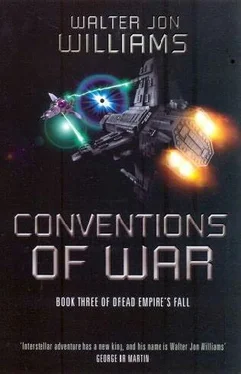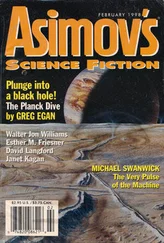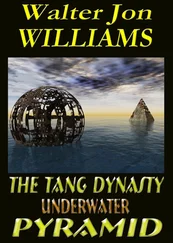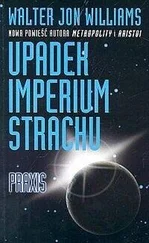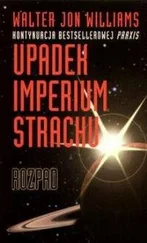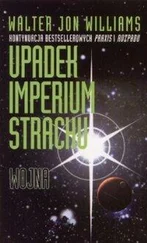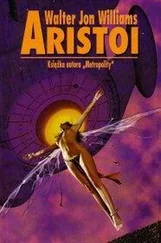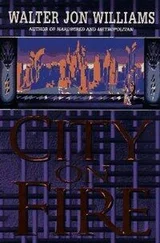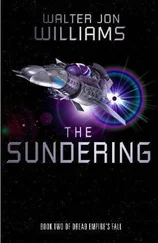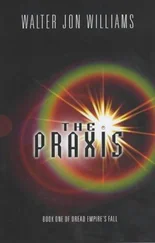Walter Williams - Conventions of War
Здесь есть возможность читать онлайн «Walter Williams - Conventions of War» весь текст электронной книги совершенно бесплатно (целиком полную версию без сокращений). В некоторых случаях можно слушать аудио, скачать через торрент в формате fb2 и присутствует краткое содержание. Жанр: Фантастика и фэнтези, на английском языке. Описание произведения, (предисловие) а так же отзывы посетителей доступны на портале библиотеки ЛибКат.
- Название:Conventions of War
- Автор:
- Жанр:
- Год:неизвестен
- ISBN:нет данных
- Рейтинг книги:5 / 5. Голосов: 1
-
Избранное:Добавить в избранное
- Отзывы:
-
Ваша оценка:
- 100
- 1
- 2
- 3
- 4
- 5
Conventions of War: краткое содержание, описание и аннотация
Предлагаем к чтению аннотацию, описание, краткое содержание или предисловие (зависит от того, что написал сам автор книги «Conventions of War»). Если вы не нашли необходимую информацию о книге — напишите в комментариях, мы постараемся отыскать её.
Conventions of War — читать онлайн бесплатно полную книгу (весь текст) целиком
Ниже представлен текст книги, разбитый по страницам. Система сохранения места последней прочитанной страницы, позволяет с удобством читать онлайн бесплатно книгу «Conventions of War», без необходимости каждый раз заново искать на чём Вы остановились. Поставьте закладку, и сможете в любой момент перейти на страницу, на которой закончили чтение.
Интервал:
Закладка:
Nobody seemed to be looking for Julien either. There was a warrant out for him, but no one appeared interested in serving it. Perhaps the Legion of Diligence thought he was still in prison somewhere; and Sergius Bakshi’s influence was enough to keep the ordinary police from pursuing any leads.
Sula’s delivery company quietly expanded, a fleet of anonymous vehicles quietly delivering contraband from one part of the city to another. One-Step was taken on as an assistant driver. Sula began to miss his presence on the pavement in front of her apartment.
Not that she often saw her apartment. She whirled through the long summer nights with Casimir, a sequence of dark, close rooms filled with dangerous young men, sweaty dance floors, and clean cool sheets. Late at night, tangled with one another in some grand hotel suite, they laid plots against the Naxids, chose targets, deployed fighters, discussed strategy.
Casimir and Julien had quietly assembled a group of young, deadly cliquemen, along with other volunteers recruited by Patel, the young cliqueman who had first volunteered to fight the Naxids for love. They called themselves the Bogo Boys, after a practically indestructible toy.
The Bogo Boys were sent against more difficult objectives. Two judges were killed, one of them an Ushgay returning to the city from his country house. A warehouse of Jagirin foodstuffs was burned. Three mid-level executives with the rationing board-a Jagirin and two Kulukrafs-were assassinated along with their bodyguards.
Sula took part in none of these operations. “You’re a general now,” Casimir reminded her, “it’s not your job to fight in the streets with the troops.” She devoted herself instead to obsessive planning, making certain that escape routes were properly laid and that no one would be left behind.
When the rebel government finally arrived from Naxas, Sula resisted Julien’s arguments to attack them as they paraded up Axtattle Boulevard to the High City. The enemy would be ready for that; and events proved her right, as thousands of Naxid police brought in from the countryside saturated the area, occupied the roofs of buildings, and lined the boulevard itself.
Instead she ordered the entire secret army go on the attack in other districts of the city. The targets didn’t matter, she emphasized, so much as explosions and fire. Cars and trucks were blown up, abandoned buildings put to the torch, flammables piled in streets or public parks and set alight. Security was concentrated on the approach route, so there was little force available to stop the attacks. The Committee for the Salvation of the Praxis moved to the High City surrounded by pillars of smoke and with the sound of explosions echoing between the buildings.
The committee and their pathetic undersized Convocation-the delegates they’d convinced or coerced into representing their home worlds-took their places in the Hall of the Convocation to take their oaths of allegiance to the new government. From that vantage point they could look through the great glass walls to the Lower Town beyond and see the tall rising columns of smoke; like the bars of a prison they had entered of their own free will.
The Naxids then grew more serious about roadblocks and searches, putting more police on the streets, importing them from other towns and barracking them in local hotels. As far as Sula was concerned, more Naxids on the streets simply meant more targets, though it also meant that attacks and escape routes had to be more carefully arranged.
Since the “official” objectives were now more difficult, the attackers shifted to softer targets. Any Naxid in the brown uniform of the civil service became a target, and eventually any Naxid at all. As a result, Naxids were a lot more scarce in parks, squares, and public concourses. They stayed in their own neighborhoods except while in transit from home to work and back again.
The Naxids wandered free only in the High City. Sula hadn’t managed a successful operation there since the assassination of Judge Makish. The security presence was too heavy, the escape routes limited, and there were too few non-Naxids living there. An armored blockhouse now guarded the one road to the summit, and both the road and the funicular railway were under the sights of antiproton guns mounted in the High City.
She rode regularly to the High City in trucks carrying luxury goods meant for the new ruling caste. From what she could see, the luxuries had become the entire point of Naxid rule. The High City was being transformed into a fortress guarding the wealth that was sticking to Naxid fingers. Her own transport company was constantly moving glittering furniture to the High City, or carpets, or ornaments, or paintings, or statues. More of the old palaces were being confiscated by the new regime and refitted to suit Naxid tastes.
Even the signs in the High City had begun to reflect the Naxid occupation. Naxid eyes embraced a different spectrum than that of Terrans: they couldn’t see red, but could see into the ultraviolet, and unlike most Terrans, they could distinguish between blue and indigo. Thus, many of the new shops and restaurants in the High City had signs that looked like blobs of gray on other blobs of gray to Sula, or one subtly different shade of blue laid on another. They might as well have read“ Naxids Only.”
Elsewhere, the loyalists were making fifty attacks per day throughout the city. Then seventy. Then eighty. Spence was occupied full-time running a bomb factory in Riverside, custom-building packages that were distributed throughout the city. The Naxid officer who ran the ration card system at the police station in that district was assassinated so often that the ration desk was moved to another station in another neighborhood.
But the news wasn’t all good. The secret army continued to lose members to arrest, to operations that went wrong, or simply to bad luck. And Naxid reprisals remained savage. Hostages died in droves.
To respond to the increased attacks upon them, the Naxids set up mobile forces to quickly catch attackers before they could withdraw. The mobile forces caught a number of loyalist units, and some fighters were killed and others captured. Still other fighters had to be hidden, along with their families, before the captured fighters could give them up.
Sula decided to teach the Naxids a lesson. She chose a conveniently located police station in a Torminel neighborhood, with mostly Torminel police, and killed the Naxid assigned as ration control officer as she arrived for work. The assassins-an entire action group of thirty-nine fighters-didn’t withdraw after the killing, but instead laid siege to the station, firing at it from cover and hitting the parking garage with rockets. The police called for help, and two of the Naxids’ mobile squads raced to the rescue.
The topography of the city told Sula which roads would be used, and she’d arranged ambushes along each beforehand. Trucks drawn across the road at the last second stopped one mobile squad on a broad street in a business district, and fighters on the surrounding buildings created a kill zone that left the entire Naxid force dead, lying in their yellow and black uniforms on the pavement next to their burning vehicles. Sula was on one of the buildings with Macnamara and Spence, pouring fire down on the trapped enemy and screaming in joyous rage as they died.
The other route to the beleaguered Torminel neighborhood was on a major highway, and Casimir and the Bogo Boys, driving big trucks in line abreast, managed to occupy all available lanes ahead of the Naxids. The trucks slowed and their rear doors cycled open, revealing tripod-mounted machine guns taken from Team 491’s storage area near the Riverside Crematorium.
The Naxid vehicles were armored, but not against such a storm of fire. The Bogo Boys sped away, leaving burning wreckage in their wake.
Читать дальшеИнтервал:
Закладка:
Похожие книги на «Conventions of War»
Представляем Вашему вниманию похожие книги на «Conventions of War» списком для выбора. Мы отобрали схожую по названию и смыслу литературу в надежде предоставить читателям больше вариантов отыскать новые, интересные, ещё непрочитанные произведения.
Обсуждение, отзывы о книге «Conventions of War» и просто собственные мнения читателей. Оставьте ваши комментарии, напишите, что Вы думаете о произведении, его смысле или главных героях. Укажите что конкретно понравилось, а что нет, и почему Вы так считаете.
